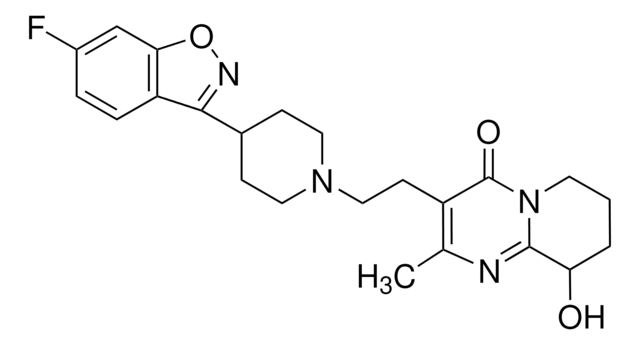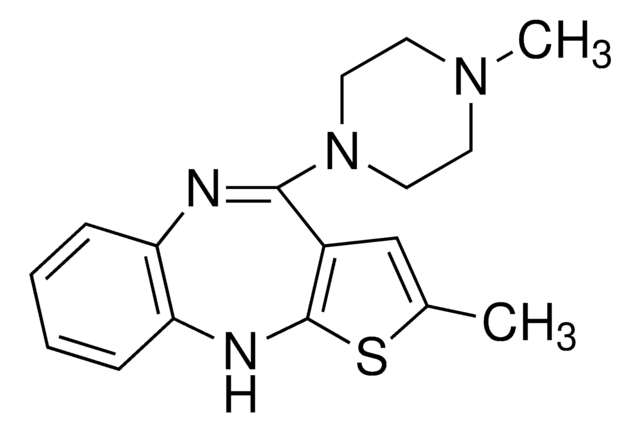P0099
Paliperidone
≥98% (HPLC)
Synonym(s):
3-[2-[4-(6-Fluoro-1,2-benzisoxazol-3-yl)-1-piperidinyl]ethyl]-6,7,8,9-tetrahydro-9-hydroxy-2-methyl-4H-pyrido[1,2-a]pyrimidin-4-one, 9-Hydroxyrisperidone
About This Item
Recommended Products
Quality Level
Assay
≥98% (HPLC)
form
powder
color
white to brown
solubility
DMSO: 2 mg/mL, clear (warmed)
originator
Johnson & Johnson
storage temp.
room temp
SMILES string
CC1=C(CCN2CCC(CC2)c3noc4cc(F)ccc34)C(=O)N5CCCC(O)C5=N1
InChI
1S/C23H27FN4O3/c1-14-17(23(30)28-9-2-3-19(29)22(28)25-14)8-12-27-10-6-15(7-11-27)21-18-5-4-16(24)13-20(18)31-26-21/h4-5,13,15,19,29H,2-3,6-12H2,1H3
InChI key
PMXMIIMHBWHSKN-UHFFFAOYSA-N
Gene Information
human ... DRD2(1813) , HTR2A(3356)
Looking for similar products? Visit Product Comparison Guide
Application
Biochem/physiol Actions
Features and Benefits
Signal Word
Danger
Hazard Statements
Precautionary Statements
Hazard Classifications
Acute Tox. 3 Oral
Storage Class Code
6.1C - Combustible, acute toxic Cat.3 / toxic compounds or compounds which causing chronic effects
WGK
WGK 3
Flash Point(F)
Not applicable
Flash Point(C)
Not applicable
Personal Protective Equipment
Certificates of Analysis (COA)
Search for Certificates of Analysis (COA) by entering the products Lot/Batch Number. Lot and Batch Numbers can be found on a product’s label following the words ‘Lot’ or ‘Batch’.
Already Own This Product?
Find documentation for the products that you have recently purchased in the Document Library.
Customers Also Viewed
Articles
We offer many products related to dopamine receptors for your research needs.
Our team of scientists has experience in all areas of research including Life Science, Material Science, Chemical Synthesis, Chromatography, Analytical and many others.
Contact Technical Service




